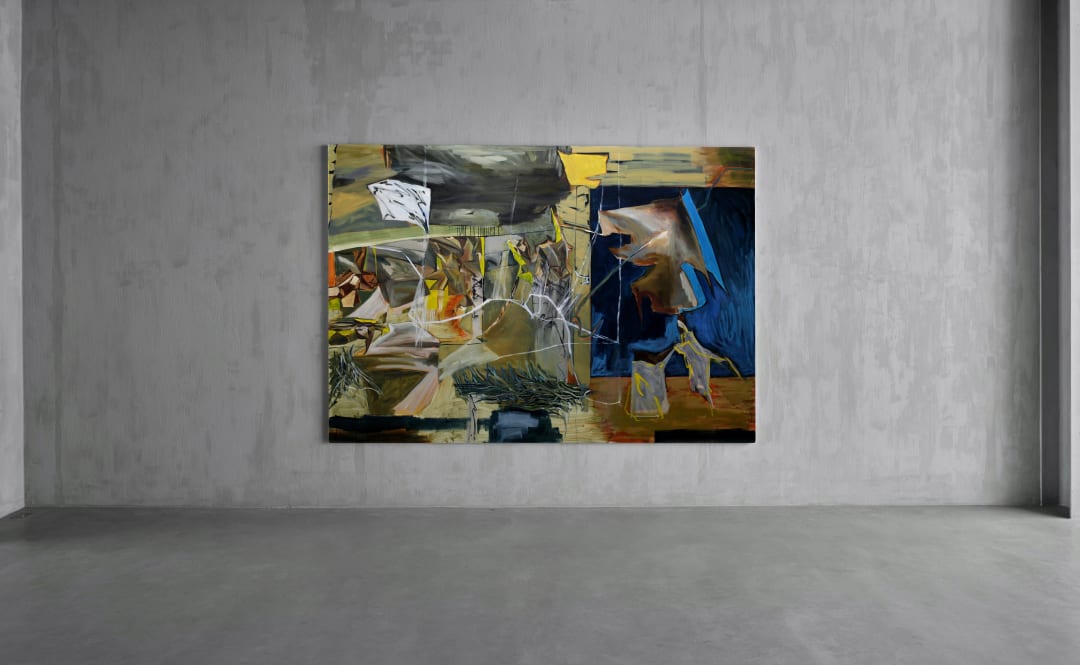Ella McVeigh: Each Glance Branching
Ella McVeigh’s paintings are webbed with art history, the role of nature in art-making and the possibilities and meanings of painting today. Starting primarily from found imagery of the natural world, McVeigh explores painting as a mental performance of visual decision-making. Whereby these images from her personal collection, ranging from studio shots of flower arrangements to encyclopedias on minerals and geology, are the trigger of an array of mental connections to other images and experiences. In the exhibition, Each Glance Branching, these visual connections are translated through her persisting interrogation of line, colour and form into paintings and drawings that capture in great detail the complexities of looking at images, oscillating from the micro to the macro with each glance.
Ella McVeigh selects, articulates, and in some way binds up what she has grasped in the exterior world and pairs it with her interior world. She sees in abstract painting vast potential for exploration on a material. Through a stream of thought approach as an internal investigation, she continually explores the possibilities of the genre. In doing so, she uses amorphous structures and intense colour planes to probe the limits of coherent image formation, similar to Albert Oehlen or Per Kirkeby’s way of working. This results in an abstract choreography, which unfolds on the canvas as the object on which the act of thinking takes place.
In McVeigh’s enigmatic paintings, we experience the presence of the exterior world as well as the transformation of all sensory experiences into imagery of new morphologies.Whereas most artists practice through preliminary studies, she constructs and deconstructs directly onto the canvas, seemingly building on old ruins. She wrings new meanings from natural structures and transforms them through a branched glance into unique aesthetic fields. The paintings reveal themselves as chaotic, rhythmic forces exploring the notion of thought processes behind painting, without falling into suggestive ideas and compositions. The result is harmonious compositions where all the elements in the paintings come to the fore as sharp-edged components, giving an enormous materiality to the canvases and creating vibrating, yet tangible painted surfaces.
One of the largest pieces in the exhibition, Spindle, conjures hues of cold and warm, bold markings, and interlacing of forms pushing elements in and outside of the canvas, and thus creating a multiperspective setting. The white, mobile lines take on a representative function, as if measuring their own relation to the blue and orange, still planes. Over areas of solid colour, she applies voracious strokes in muddy greens and greys, as well as earthy tones, further complicating her conflation of erasure and enhancement. As viewers, we are presented with the opportunity of getting face-to-face with an organic language of forms, stemming from its own world.
Despite our tendency to think of abstract painting as an expression of an artist’s inner, emotional state, emotion is not central to McVeigh’s practice. However, the paintings possess an affecting strength, palpable in the interaction of the viewer with the materiality of the canvases. For McVeigh, painting means trying to solve the problem of arriving at compositions that are coherent, combining imagery from encyclopedias and technical books with her memory or imagination. Starting from divergent and sometimes even conflicting stances, she seeks to achieve - by means of methodic visual decision-making - a congruous final image. In her painting Proscenium, artificial structures, natural yet intense planes of colour and linear configurations unfold into the elements that seem to repeat themselves as apparent morphological elements throughout all the paintings. In this sense, McVeigh is particularly concerned with finding the right coherence between all the elements on the canvas.
A vast range of images - both natural and artificial - are the inspiration of Ella McVeigh’s work. However, the works remain shrouded in the infinite and evoke, as it were, the inner yet inscrutable truth of nature. In Each Glance Branching, painting is presented as an area of examination, in which the ideas about abstract art and especially the formatting of pictures and structures are being defined. The exhibition issues the way in which the artist sees her way of painting as a problem- solving process, creating harmony out of chaos while combining natural and artificial structures that slowly unfold on the canvas. McVeigh’s approach of layering and visible complexity makes the works ultimately unknowable, eluding any efforts to be read as stories. The radical indeterminacy of the works is what makes them living, breathing entities separate from the artist’s hand.
The barcode on the snakes scale was the give away that the whole thing was synthesised, as the weather in my computer world was changeable
Scanning the room, the page, across green and grey landscapes Where am I focused?
Under a microscope the limescale flakes in my kettle are dahlias.
A sight at every scale, thoughts that link, with each glance branching.
— Ella McVeigh

